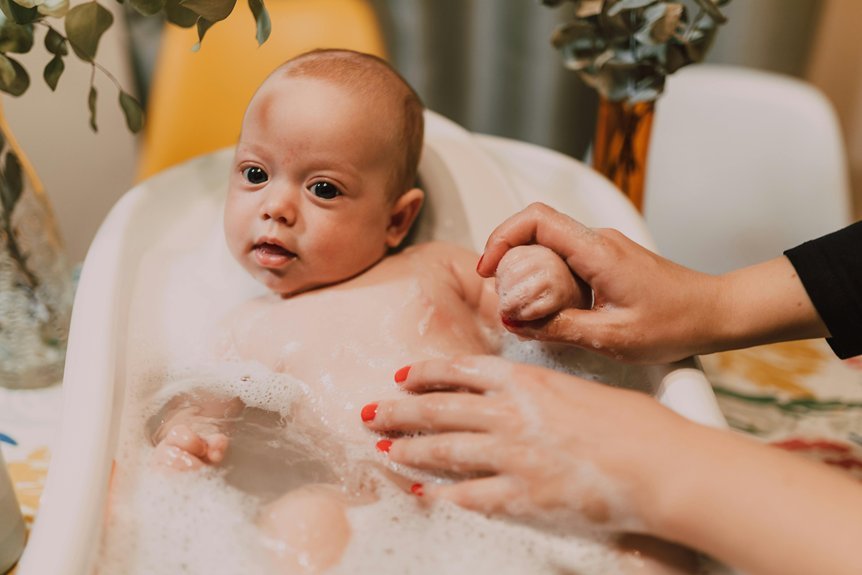How Often Should You Bathe a Baby?

When it comes to bathing your baby, understanding their delicate skin is crucial. Newborns have thinner, more sensitive skin, which means you might not need to bathe them every day. As they grow, your bathing routine will likely change. But how do you know when it's the right time to bathe them more frequently? Let's explore the recommended bathing frequency based on age and other important factors.
Understanding Newborn Skin Care
When you bring your newborn home, understanding their delicate skin care is crucial since their skin is sensitive and can easily be affected by the environment.
Newborn skin is thinner than yours, making it prone to dryness and irritation. To keep it healthy, use a gentle, fragrance-free cleanser and moisturize regularly.
Avoid products with harsh chemicals or dyes, as these can lead to rashes and discomfort. Always test new products on a small area first to check for reactions.
Dress your baby in breathable fabrics, and be mindful of temperature changes to prevent overheating.
Bathing Frequency by Age
As your baby grows, their bathing frequency will change based on their age and activity level.
For newborns, bathing just two to three times a week is usually enough since their skin is delicate.
Once they hit around six months, you can increase bath time to every other day, especially as they start to explore and get messier.
By their first birthday, daily baths are generally fine, particularly if they enjoy splashing around.
Keep in mind, though, that if your little one has sensitive skin, you might want to stick to every few days.
Always monitor their skin's reaction to baths and adjust your routine accordingly for their comfort and health.
Signs Your Baby Needs a Bath
Recognizing when your baby needs a bath can help keep their skin healthy and comfortable.
Look for signs like a buildup of milk or formula on their chin and cheeks after feeding. If your baby's skin feels sticky or oily, it's time for a wash. You might also notice a sour smell, especially in the diaper area, indicating they need a bath.
If your little one has been sweating during playtime or has been in a messy situation, a bath is essential. Lastly, keep an eye on their hair; if it looks greasy or dirty, that's another clear sign.
Regular baths can enhance your baby's comfort and keep their skin free from irritation.
Tips for a Safe and Enjoyable Bath Time
Creating a safe and enjoyable bath time for your baby starts with preparation. Gather all your supplies—gentle soap, a soft washcloth, a towel, and any toys—before you start.
Always check the water temperature with your wrist; it should be warm, not hot. Fill the tub with just a few inches of water to minimize risk. Use a non-slip mat to keep your baby steady.
Never leave your baby unattended, even for a second. Keep your voice calm and cheerful to help soothe any anxiety.
Make bath time fun by introducing toys, but ensure they're safe for infants. After the bath, wrap your baby snugly in a towel to keep them warm and enjoy some cozy cuddle time.
Conclusion
In conclusion, bathing your baby isn't just about keeping them clean; it's also about protecting their delicate skin. For newborns, stick to 2-3 baths a week, and feel free to increase the frequency as they grow. Always pay attention to their skin and adjust your routine if needed. By following these guidelines, you can ensure a safe and enjoyable bath time for both you and your little one. Happy bathing!
